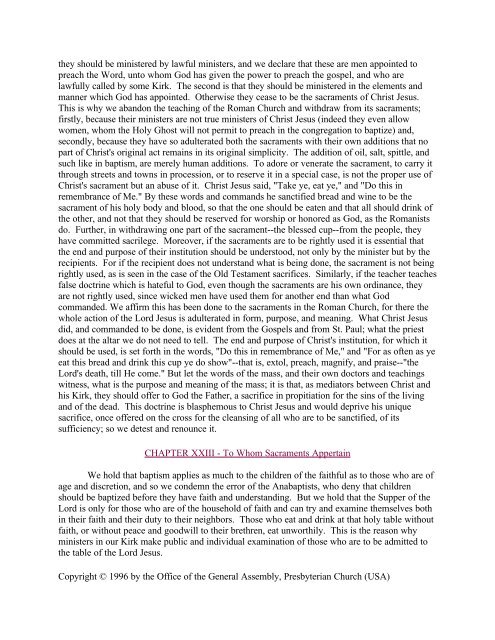The Book of Confessions - The Presbyterian Leader
The Book of Confessions - The Presbyterian Leader
The Book of Confessions - The Presbyterian Leader
You also want an ePaper? Increase the reach of your titles
YUMPU automatically turns print PDFs into web optimized ePapers that Google loves.
they should be ministered by lawful ministers, and we declare that these are men appointed to<br />
preach the Word, unto whom God has given the power to preach the gospel, and who are<br />
lawfully called by some Kirk. <strong>The</strong> second is that they should be ministered in the elements and<br />
manner which God has appointed. Otherwise they cease to be the sacraments <strong>of</strong> Christ Jesus.<br />
This is why we abandon the teaching <strong>of</strong> the Roman Church and withdraw from its sacraments;<br />
firstly, because their ministers are not true ministers <strong>of</strong> Christ Jesus (indeed they even allow<br />
women, whom the Holy Ghost will not permit to preach in the congregation to baptize) and,<br />
secondly, because they have so adulterated both the sacraments with their own additions that no<br />
part <strong>of</strong> Christ's original act remains in its original simplicity. <strong>The</strong> addition <strong>of</strong> oil, salt, spittle, and<br />
such like in baptism, are merely human additions. To adore or venerate the sacrament, to carry it<br />
through streets and towns in procession, or to reserve it in a special case, is not the proper use <strong>of</strong><br />
Christ's sacrament but an abuse <strong>of</strong> it. Christ Jesus said, "Take ye, eat ye," and "Do this in<br />
remembrance <strong>of</strong> Me." By these words and commands he sanctified bread and wine to be the<br />
sacrament <strong>of</strong> his holy body and blood, so that the one should be eaten and that all should drink <strong>of</strong><br />
the other, and not that they should be reserved for worship or honored as God, as the Romanists<br />
do. Further, in withdrawing one part <strong>of</strong> the sacrament--the blessed cup--from the people, they<br />
have committed sacrilege. Moreover, if the sacraments are to be rightly used it is essential that<br />
the end and purpose <strong>of</strong> their institution should be understood, not only by the minister but by the<br />
recipients. For if the recipient does not understand what is being done, the sacrament is not being<br />
rightly used, as is seen in the case <strong>of</strong> the Old Testament sacrifices. Similarly, if the teacher teaches<br />
false doctrine which is hateful to God, even though the sacraments are his own ordinance, they<br />
are not rightly used, since wicked men have used them for another end than what God<br />
commanded. We affirm this has been done to the sacraments in the Roman Church, for there the<br />
whole action <strong>of</strong> the Lord Jesus is adulterated in form, purpose, and meaning. What Christ Jesus<br />
did, and commanded to be done, is evident from the Gospels and from St. Paul; what the priest<br />
does at the altar we do not need to tell. <strong>The</strong> end and purpose <strong>of</strong> Christ's institution, for which it<br />
should be used, is set forth in the words, "Do this in remembrance <strong>of</strong> Me," and "For as <strong>of</strong>ten as ye<br />
eat this bread and drink this cup ye do show"--that is, extol, preach, magnify, and praise--"the<br />
Lord's death, till He come." But let the words <strong>of</strong> the mass, and their own doctors and teachings<br />
witness, what is the purpose and meaning <strong>of</strong> the mass; it is that, as mediators between Christ and<br />
his Kirk, they should <strong>of</strong>fer to God the Father, a sacrifice in propitiation for the sins <strong>of</strong> the living<br />
and <strong>of</strong> the dead. This doctrine is blasphemous to Christ Jesus and would deprive his unique<br />
sacrifice, once <strong>of</strong>fered on the cross for the cleansing <strong>of</strong> all who are to be sanctified, <strong>of</strong> its<br />
sufficiency; so we detest and renounce it.<br />
CHAPTER XXIII - To Whom Sacraments Appertain<br />
We hold that baptism applies as much to the children <strong>of</strong> the faithful as to those who are <strong>of</strong><br />
age and discretion, and so we condemn the error <strong>of</strong> the Anabaptists, who deny that children<br />
should be baptized before they have faith and understanding. But we hold that the Supper <strong>of</strong> the<br />
Lord is only for those who are <strong>of</strong> the household <strong>of</strong> faith and can try and examine themselves both<br />
in their faith and their duty to their neighbors. Those who eat and drink at that holy table without<br />
faith, or without peace and goodwill to their brethren, eat unworthily. This is the reason why<br />
ministers in our Kirk make public and individual examination <strong>of</strong> those who are to be admitted to<br />
the table <strong>of</strong> the Lord Jesus.<br />
Copyright © 1996 by the Office <strong>of</strong> the General Assembly, <strong>Presbyterian</strong> Church (USA)




